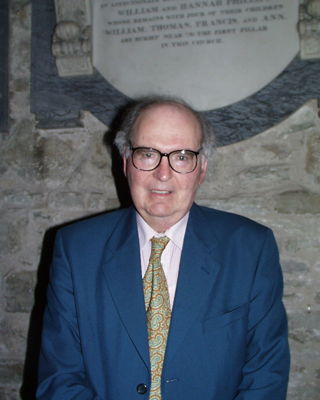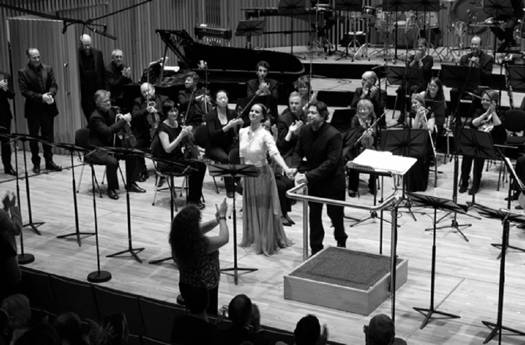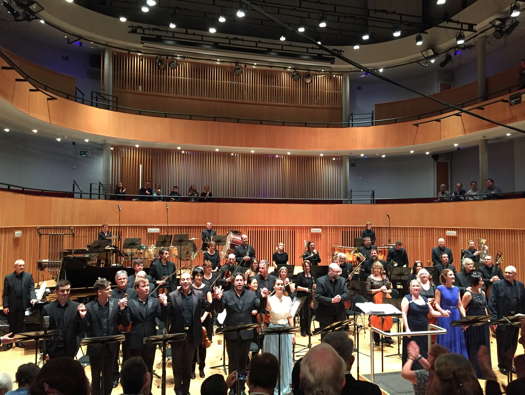|

Fresh and Original
John Joubert's opera 'Jane Eyre',
experienced by RODERIC DUNNETT
In discussing recent British music and the current older generation, much has been talked about the Manchester group — Birtwistle, Goehr and Maxwell Davies — it too often leads to forgetting that there is a formidable groups of composers of roughly the same era who have palpably made their mark, yet who deserve to be more fully recognised — included perhaps, and far more often performed — than is their usual experience.
Those in the know will doubtless recognise that Nicholas Maw, Richard Rodney Bennett, Thea Musgrave, Malcolm Williamson, William Mathias, Peter Dickinson, Gordon Crosse and a clutch of other talented and important figures have all made a desirable contribution to British music over several decades.
Perhaps the most eminent of all of these is John Joubert. Just as Williamson arrived in the early 1950s from Australia, so in the mid '40s Joubert — his name reflects a French Huguenot ancestry — came to England from South Africa, winning a scholarship to study at the Royal Academy.
His output since, totalling nearly 200 opus numbers, is truly impressive. He has made his mark in virtually every field: chamber works, symphonies, choral cantatas and much else. Indeed in the field of choral output he has possibly outdone all others, except for Davies.

John Joubert in St Andrew's Church Presteigne, attending the Presteigne Festival in August 1999. Photo © 1999 Keith Bramich
|
A few years ago Joubert's opera Jane Eyre was given a modestly staged performance in Birmingham. I say modestly, because it was, regrettably, a rather paltry effort. At no time did one hear satisfactorily the power of the score, or sense, other than in a rather mild way, the drama and intensity of Jane's relationship with the hesitant, and latterly blinded, Edward Rochester. One yearned for the opera to take off. It did not.
Now we have been subjected to a wholly different experience, presented as a concert performance — and a 'world premiere' — but positively reeking of drama and tension, at the Ruddock Performing Arts Centre [15 October 2016], a most impressive, in fact ideal, tiered venue linked to two Birmingham Schools.
I was fortunate enough to obtain, some years ago, a cassette tape of Joubert's full-length opera Under Western Eyes, based on Joseph Conrad, which is a magnificent achievement — uneasy, disturbing, at times gnawingly dramatic — and cries out to be taken up by one of the major opera companies. But the present experience with Jane Eyre took me by surprise. The score is every bit as gripping, magnificently scored and fabulously constructed as the Conrad opera. It took this new Birmingham audience by storm.
One has, I think, to add a caveat at this point. Joubert and his librettist, Kenneth Birkin, have taken certain decisions regarding the Charlotte Brontë novel which, while commonsense and understandable, could jeopardise its impact onstage. The first half, which omits Jane's youth at Lowood School (which might surely have lent contrast early on), includes (apart from a diminutive role for Mrs Fairfax, sung by Clare McCaldin) only one additional major character: the domineering Mr Brocklehurst; so that the opening drama hinges on Jane's determination to leave Lowood, and his resentful attempts to prevent her. Gwion Thomas (who also understudied Rochester) made a strong showing as the autocratic head; and the scene had the advantage of showing us the splendid, strong-willed Jane of April Fredrick, whose terrific dramatic sense, reflected both visually and vocally, revealed the music as not just dramatic but utterly riveting.

April Fredrick as Jane and David Stout as Rochester receive audience applause at the end of the concert premiere of John Joubert's 'Jane Eyre'. Click on the image for higher resolution
|
In Act 2 a different issue arose. Some eight to ten characters appear onstage for the church (aborted wedding) scene; several of them sing scarcely a few lines, not even enough to assess the undoubted quality of their voices. Then they disappear. This is surely unrealistic. Such a turnout could be justified if they doubled as a chorus (for which there is seemingly no call). The shocking news about Rochester's previous marriage was delivered by the brother in law's (Mason's) solicitor. It was pronounced by Andrew Mayor to extreme effect — forceful and rather sinister. But with Mason himself — Mark Milhofer — onstage, it could easily have been expounded by him (although a tenor). Alan Fairs was there to make a very decent job of the Reverend Wood, managing just to be heard by an orchestra that was perhaps a little too overbearing at that particular point.
The result is, dramatically speaking, a bit lopsided. With so much of the first part consisting of the long exchange between Jane and Rochester, and indeed most of the second also, there was the danger of repetitiveness and a tendency to sag. That this did not happen owed much to Milhofer's doubling as the supportive Revd St John Rivers, and a huge amount to the central pair, April Fredrick and the equally magnificent David Stout. Fredrick in every part of her range — and not least soaring, as Joubert makes her, into high tessitura in moments of tension or apprehension — was utterly absorbing to listen to. Indeed, if there was any tussle with the orchestra, conducted throughout with wonderful command and control by the very impressive Kenneth Woods, it did not affect her at all. Meanwhile Stout, who has clearly moved into the front rank, and looking like a forceful Oliver Reed, matched her at every turn. His was a superb, masterful performance, initially moody, sombre and quite severe, all the more impressive as both of them had so much music to learn and, presumably, limited rehearsal time.
But one other thing that took this occasion by storm was the playing of the English Symphony Orchestra: as committed and on the ball as I've heard them. Christopher Morley in his appreciation of Joubert points to three composers who were a hefty influence on Joubert: Verdi, Wagner and Britten. And certainly the latter two were much in evidence, and the orchestra ranged from the explosiveness of Bayreuth's genius to the immense subtlety of Britten: Peter Grimes and The Turn of the Screw (and perhaps even, in the church scene outcry, Owen Wingrave).
What made this array of players, and surely Woods' conducting, so doubly impressive was that Joubert deploys single woodwind (cor anglais, bass clarinet and very sparely contrabassoon), and one of each brass (including tuba); the way he pairs the instruments (solo brass and wind producing quite surprising textures), and the fact that with relatively few strings a full Wagner orchestra sound was (staggeringly) produced, made the orchestral achievement all the greater. On the percussion side Joubert allows himself more luxury: tympani, bass drum, gong, strung cymbal, xylophone and glockenspiel — and indeed sparingly used piano, especially later — all made telling contributions, especially as he boldly treats them as part of the orchestra, not always as an extra 'effect'.
One could mention a thousand subtle and arresting moments: cor anglais and bass clarinet for Jane's tussle with Brocklehurst ('You're needed here'). Thoroughly proficient, sour brass ('This is ingratitude'). Huge upward sweeps of full orchestra to match Jane's comparable ascents, and a superb similar surge later for Rochester. Horn, then flute and trumpet leading the transition to Thornfield Hall (Rochester's residence) then distinctly Brittenesque trumpet and rocking flute, with xylophone added. A subtle working through each woodwind in turn during Rochester's quiet, subdued aria, and bassoon matching drum for his ensuing soliloquy, which becomes a lament in which full woodwind and xylophone yield to the brass.
It is this handing over of the musical baton which Joubert achieves such marvels with: it is as if the solo instruments are communicating intimately and elegantly with each other almost as if this were a string quartet or wind quintet. And where it is most lightstepped — wind then brass have one positively pointilliste sequence — it is impossible not to be reminded of The Turn of the Screw; at several moments, something akin to the lake scene from the same opera is evoked.
By the end of Act I Rochester has declared his love and the pair end with a sequence in unison, a meeting of minds and hearts. The inventiveness, however, never ceases: the sneering woodwind for the rather frightening Solicitor, Mr Briggs. A highly effective passage where tympani and bass drum are joined by organ. Or the blasting brass, led in by trombone, for the massed voice outcry, 'Bigamy'. There is a splendid, eerie touch where, as Jane expresses her doubts, she is mirrored by a trilling bassoon. And as she forcefully voices her Angst, Joubert places a cymbal within the textures, ever so subtly, and actually quite brilliantly.
A violent outburst for the desolate Rochester, after the fire has left him desperate and deprived, subsides very strikingly, thanks to Joubert's deftness, to just trumpet and horn in conversation, plus bassoon. As clarinet has recalled their Act I love theme over his grieving, so solo flute recalls it, as she approaches him, now blinded. Trumpet and horn pass the baton to trombone and tuba — two pairings that, given their musical lines, make a notable impact. The piano is important too, furnishing light chordings.
I have to yield to a temptation: Under Western Eyes brought to mind for me long ago a kinship, in a sense a line of descent, between Joubert's writing and the Germans of early last century: Schreker's Der Ferne Klang, for example. Why? It may be some similarity in the use of the orchestra, but perhaps something in the vocal language too; but of course, coincidence is the most likely. Joubert lowers the temperature for the final exchanges: piano backing up vividly paired oboe and clarinet; first and second violin soli, with horn. And at the last, solo violin (Sarah Sew) and clarinet, fading double bass, and tympani.
Joubert's orchestration is fresh and original from start to finish. What else helped this to be a quite magnificent concert performance, all the more pleasing as it was being recorded live by the ever-bold and imaginative SOMM Recordings?
The entire contribution of the orchestra — for them too this must have necessitated a lot of homework — was utterly to be admired. Kenneth Woods' direction seemed pretty much masterly: at no time did one feel his pacings were anything short of perfectly judged: he kept the flow and the constant undertow absolutely spot on: only Joubert could say for certain if that feeling is right, and if it supplied what he wanted. But most likely it did: one had absolute confidence in Woods' leadership and demeanour, which patently yielded such glorious results.

Conductor Kenneth Woods (centre) with soloists and the English Symphony Orchestra on completion of Joubert's 'Jane Eyre' in Birmingham UK. Click on the image for higher resolution
|
But perhaps the number one accolade, apart from to John Joubert himself, has to go to April Fredrick. Her passion and utter conviction, her display of maturity for a girl (initially) turned eighteen, her every sideways glance and flick of her head, flicker of an eyelid and look of suspicion, the amount she achieved with small, silent swerves of her body, clenched fist or adjustment of an elbow, and her quite fabulous, variable voice, powerful and expressive right across the range, made Brontë's Jane come alive in this arresting opera. No wonder the genuinely exciting evening was such a treat: a truly rich experience.
Copyright © 1 November 2016
Roderic Dunnett,
Coventry UK

|

